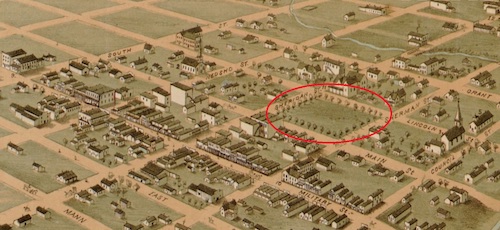Peirspictiochtai Ar An Saol
Democracy Is At Stake
Part Three
 A birds-eye view of Baxter Springs shows the empty lot (in the red circle) between Sheridan and Sherman Streets as well as between Main and Lincoln Streets (three of these streets were renamed in later years) that would be the future site of the Cherokee County Court House (a building that was never actually used as a court house). (The image was provided courtesy of the Library of Congress, 1871.)
A birds-eye view of Baxter Springs shows the empty lot (in the red circle) between Sheridan and Sherman Streets as well as between Main and Lincoln Streets (three of these streets were renamed in later years) that would be the future site of the Cherokee County Court House (a building that was never actually used as a court house). (The image was provided courtesy of the Library of Congress, 1871.)
Last week, Peirspictiochtai Ar An Saol detailed some of the aspects involving elections in Cherokee County, Kansas, in the 1860s. Further details on why allegations of election fraud were made in this community are included in this edition of Peirspictiochtai Ar An Saol.
Continuing to quote from a news article dated January 24, 1885 – headlined "Our Court House Claim" – in the Baxter Springs News, the newspaper questioned the validity of a news article included in The Columbus Advocate on January 15, 1885.
The news articles focused on the election held on February 17, 1869, to determine the site for the county seat of Cherokee County – Columbus, Kansas, or Baxter Springs, Kansas.
"The vote was canvassed on the 20th of February [1869], and it was found that Baxter Springs had in her favor a total vote of 1,118," detailed the news article in the Baxter Springs News. "Of this number the town of Baxter Springs had furnished 1,045, the balance of the county having cast 73 in her favor. The returns from the whole county were in except those from Lola Township, and it was found that Columbus had but 799 votes. The party intrusted with the transmission of the returns from Lola Township, upon arriving at the court where the vote was being canvassed, found that he had 'lost' the returns. He thereupon immediately set out to find them. He soon returned, having found them 'in the lining of his overcoat,' and then it was found that little Lola had done her duty nobly, she having come up smiling with 352 votes for Columbus, thus bringing up the total vote for Columbus to 1,151 – a majority of 33 over Baxter Springs."
A paragraph followed the above quotes in a book that had been published in 1883, William G. Cutler's History of the State of Kansas, but the paragraph was not included in this news article in the Baxter Springs News. This paragraph provides some context regarding the apparent election fraud that delivered the county seat designation to Columbus:
"As showing the fraudulent character of the vote cut at this election, the following comparisons are useful: The total vote on county seat was 2,276, while the total vote for President in November, 1868, was but 1,358, Lola Township having cast but 102, and Baxter Springs but 112. And in 1882, the total vote for Governor in Lola Township was only 203, while in Baxter Springs, it was 182, and the total vote in Spring Valley Township in which Baxter Springs is located, including the vote of Baxter Springs, was but 376."
In other words, Lola Township had 352 people who voted on the county seat selection in February of 1869, yet only 102 people voted in the Presidential election in November of 1868. Years later, Lola Township had only 203 people who voted in the Gubernatorial election in 1882.
As for Baxter Springs, the community had 1,045 people who voted on the issue of the county seat location in February of 1869, yet only 112 people voted in the Presidential election in November of 1868. Baxter Springs had only 182 people who voted in the Gubernatorial election in 1882.
To put these numbers into further perspective, the United States Census of 1870 reported that Columbus had a total of 402 residents, Lola Township had 650 residents living in that community, and 1,284 people were residents of Baxter Springs. These census numbers included all residents, including children. Please note that not all adults were allowed to vote at that time, and of those allowed, not all were registered to vote. It should be noted that it is very likely that not all registered voters actually voted.
The Joplin Globe on September 9, 1928, reporting about the 1869 election in Cherokee County, noted that "When the results of the contest were shown, neither faction dared charge the other with fraud, for it was too plainly evident that both had practiced it."
Today, Columbus, Kansas, continues to be the county seat of Cherokee County, Kansas. Not withstanding the "questionable" election results from years ago.
Peirspictiochtai Ar An Saol – Gaelic – Irish – for "Perspectives On Life" is a column focused on aspects of accountability and responsibility as well as ways people look at life.
Contact Richard McDonough at
© 2024 Richard McDonough










